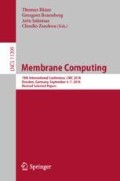Abstract
APCol systems (Automaton-like P colonies) are variants of P colonies where the environment is given by a string and the agents change their own states and the environmental string similarly to automata. By the original definition, the input (initial environmental) string is accepted if it can be reduced to the empty word. In this paper, we continue the examination of a variant of APCol systems where the agents explore and verify their common environment (the notion was introduced as verifying APCol systems). In this case, an input string of length n is accepted if there is a halting computation c such that the length of the environmental strings remains unchanged during the computation and for every agent and for each position each i, \(1\le i\le n\), there is an environmental string obtained by c such that the agent applies a rule to position i. Improving a previous result, we show that APCol systems with verifier agents simulate nondeterministic two-way multihead automata. The result implies that any language in \(\text {NSPACE}(\log n)\)can be accepted by an APCol system with verifier agents.
Access this chapter
Tax calculation will be finalised at checkout
Purchases are for personal use only
References
Cienciala, L., Ciencialová, L., Csuhaj-Varjú, E.: Towards on P colonies processing strings. In: Proceedings of BWMC 2014, Sevilla, pp. 102–118 (2014). Fénix Editora, Sevilla (2014)
Cienciala, L., Ciencialová, L., Csuhaj-Varjú, E.: P colonies processing strings. Fundam. Inform. 134(1–2), 51–65 (2014)
Cienciala, L., Ciencialová, L., Csuhaj-Varjú, E.: A class of restricted P colonies with string environment. Nat. Comput. 15(4), 541–549 (2016)
Ciencialová, L., Csuhaj-Varjú, E., Cienciala, L., Sosík, P.: P colonies. Bull. Int. Membr. Comput. Soc. 1(2), 119–156 (2016)
Cienciala, L., Ciencialová, L., Csuhaj-Varjú, E., Vaszil, Gy.: Verifying APCol systems. In: Hinze, T., Behre, J. (eds.) Proceedings of the 19th International Conference on Membrane Computing (CMC19), pp. 247–258. Verlag ProBusiness, Berlin (2018)
Csuhaj-Varjú, E., Kelemen, J., Păun, G., Dassow, J. (eds.): Grammar Systems: A Grammatical Approach to Distribution and Cooperation. Gordon and Breach Science Publishers Inc., Newark (1994)
Hartmanis, J.: On non-determinacy in simple computing devices. Acta Informatica 1, 336–344 (1972)
Holzer, M., Kutrib, M., Malcher, A.: Complexity of multi-head finite automata: origins and directions. Theor. Comput. Sci. 412, 83–96 (2011)
Kelemenová, A.: P colonies, chap. 23.1. In: Păun, Gh., Rozenberg, G., Salomaa, A. (eds.) The Oxford Handbook of Membrane Computing, pp. 584–593. Oxford University Press, Oxford (2010)
Kelemen, J., Kelemenová, A., Păun, G.: Preview of P colonies: a biochemically inspired computing model. In: Workshop and Tutorial Proceedings. Ninth International Conference on the Simulation and Synthesis of Living Systems (ALIFE IX), Boston, MA, pp. 82–86 (2004)
Kelemen, J., Kelemenová, A.: A grammar-theoretic treatment of multiagent systems. Cybern. Syst. 23(6), 621–633 (1992)
Meduna, A., Zemek, P.: Jumping finite automata. Int. J. Found. Comput. Sci. 23(7), 1555–1578 (2012)
Păun, G., Rozenberg, G., Salomaa, A. (eds.): The Oxford Handbook of Membrane Computing. Oxford University Press Inc., New York (2010)
Rozenberg, G., Salomaa, A. (eds.): Handbook of Formal Languages I-III. Springer, Heidelberg (1997). https://doi.org/10.1007/978-3-642-59126-6
Acknowledgments
The work of L. Ciencialová and L. Cienciala was supported by The Ministry of Education, Youth and Sports from the National Programme of Sustainability (NPU II) project IT4Innovations excellence in science - LQ1602, by SGS/13/2016. The work of E. Csuhaj-Varjú and Gy. Vaszil was supported by Grant No. 120558 of the National Research, Development, and Innovation Office, Hungary.
Author information
Authors and Affiliations
Corresponding author
Editor information
Editors and Affiliations
Rights and permissions
Copyright information
© 2019 Springer Nature Switzerland AG
About this paper
Cite this paper
Ciencialová, L., Csuhaj-Varjú, E., Vaszil, G., Cienciala, L. (2019). APCol Systems with Verifier Agents. In: Hinze, T., Rozenberg, G., Salomaa, A., Zandron, C. (eds) Membrane Computing. CMC 2018. Lecture Notes in Computer Science(), vol 11399. Springer, Cham. https://doi.org/10.1007/978-3-030-12797-8_8
Download citation
DOI: https://doi.org/10.1007/978-3-030-12797-8_8
Published:
Publisher Name: Springer, Cham
Print ISBN: 978-3-030-12796-1
Online ISBN: 978-3-030-12797-8
eBook Packages: Computer ScienceComputer Science (R0)

